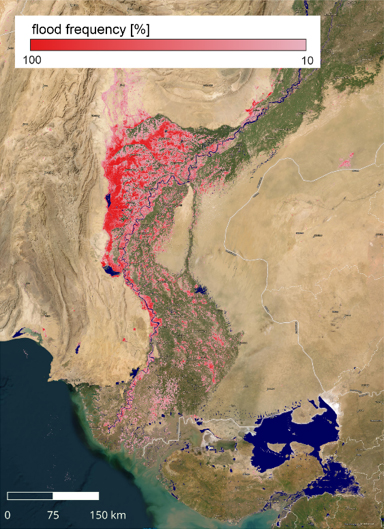
The United Nations weather agency, in collaboration with partners, has officially confirmed that July 2023 attained the highest global average temperature ever recorded, potentially reaching levels unseen for over 120,000 years. Samantha Burgess, Deputy Director at the European Commission’s Copernicus Climate Change Service, emphasized that July's temperature exceeded the average for the period from 1815 to 1900, an era often considered as pre-industrial times, by around 1.5 degrees Celsius. She also pointed out the occurrence of widespread heatwaves across various regions during the month.

Punjab has significant potential for biomass to combat climate change. Biomass is organic material that can be used to produce energy. It can be derived from a variety of sources, including agricultural waste, wood, and animal manure.

Researchers from the University of Bonn have harnessed cutting-edge technology and innovative methodologies to achieve an unparalleled understanding of global water distribution and its changes over the past two decades. By fusing the hydrological model WaterGAP with data from the GRACE satellite mission, the team, led by Prof. Dr.-Ing. Jürgen Kusche, has generated an intricate portrayal of Earth's water balance dynamics. Their groundbreaking findings, soon to be published in the Journal of Geodesy, illuminate the extent and impact of droughts and facilitate forecasts of climate change effects on water systems.

Recent research led by Mebrahtu Weldeghebriel, PhD '22, a postdoctoral fellow at Princeton University, in collaboration with Binghamton University's Distinguished Professor of Earth Sciences, Tim Lowenstein, has uncovered a remarkable connection between chemical shifts in seawater and the geological history of our planet. Utilizing advanced equipment and a unique approach, the team explored the evolution of seawater chemistry over an astounding span of 150 million years, revealing insights into geological phenomena and climate transformations. Their groundbreaking study,

In a groundbreaking development, engineers at the Massachusetts Institute of Technology (MIT) have created a cutting-edge energy storage system using ancient and abundant materials. The innovative technology, called a supercapacitor, has the potential to revolutionize energy storage, particularly for renewable sources like solar, wind, and tidal power, by maintaining stable energy networks amid fluctuations in renewable energy supply.

A recent study featured in the journal Science, conducted by an international team of climate experts and paleo-biologists from South Korea and Italy, has revealed a captivating narrative linking early human interbreeding to past changes in atmospheric CO2 levels and corresponding shifts in climate and vegetation. This innovative approach sheds light on the intriguing interactions between different hominin species, such as Neanderthals and Denisovans, and the influence of climatic conditions on their interbreeding patterns.

As Earth's temperature continues to rise at an alarming rate, scientists are tirelessly exploring innovative strategies to mitigate the impacts of climate change. Among these approaches, a groundbreaking concept put forth by astronomer István Szapudi from the University of Hawaiʻi Institute for Astronomy proposes a solar shield combined with a tethered asteroid as a potential game-changer. Published in the Proceedings of the National Academy of Sciences, his paper, "Solar radiation management with a tethered sun shield," outlines a visionary plan that could potentially revolutionize climate change mitigation efforts.

The devastating wildfires have been raging in Hawaii, particularly on the island of Maui. Climate change is playing a role in these wildfires, as it is making the conditions more conducive to fire. climate change is causing the state to experience more frequent and intense droughts, which dries out vegetation and makes it more flammable. In addition, climate change is causing the state to experience more extreme weather events, such as hurricanes, which can also contribute to wildfires.

This summer, Asia has been impacted by the scorching heat waves as the temperatures reached record-breaking highs. The article cites scientists who say that the heat wave is a sign of the growing impacts of climate change.

The recent two-day summit in Belém, Brazil, involving the eight countries that share the Amazon basin, has fallen short of its goal to combat deforestation, according to climate activists. While a joint declaration was issued to address deforestation, the agreement lacked concrete measures, prompting criticism from climate advocates who assert that the urgency of the climate crisis demands stronger action.